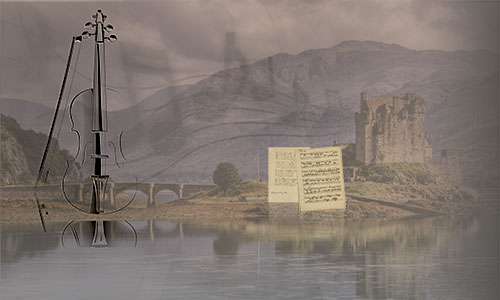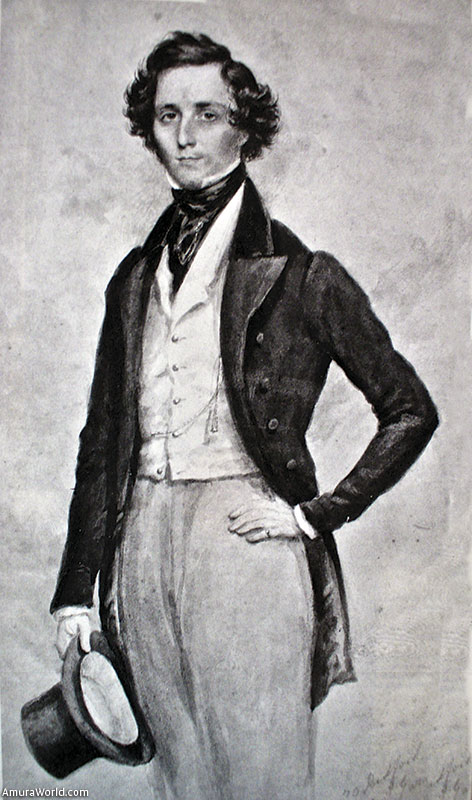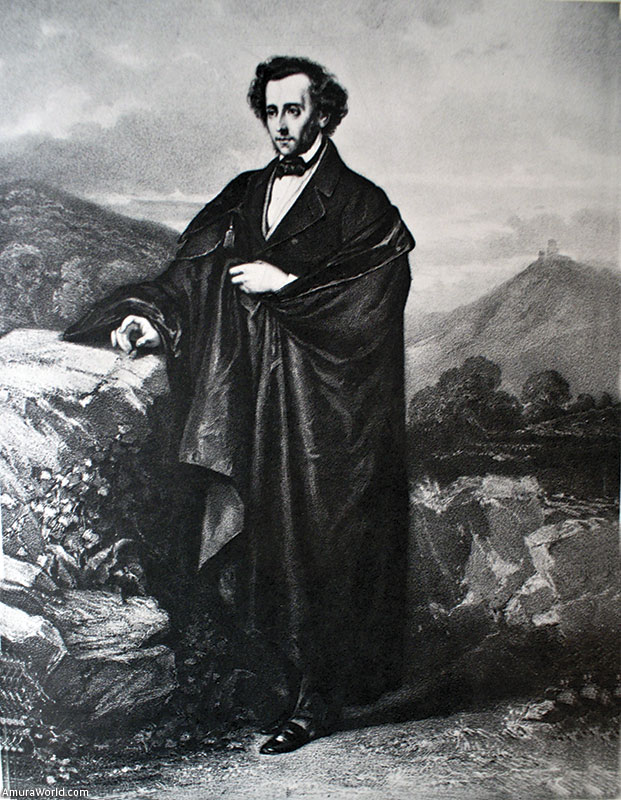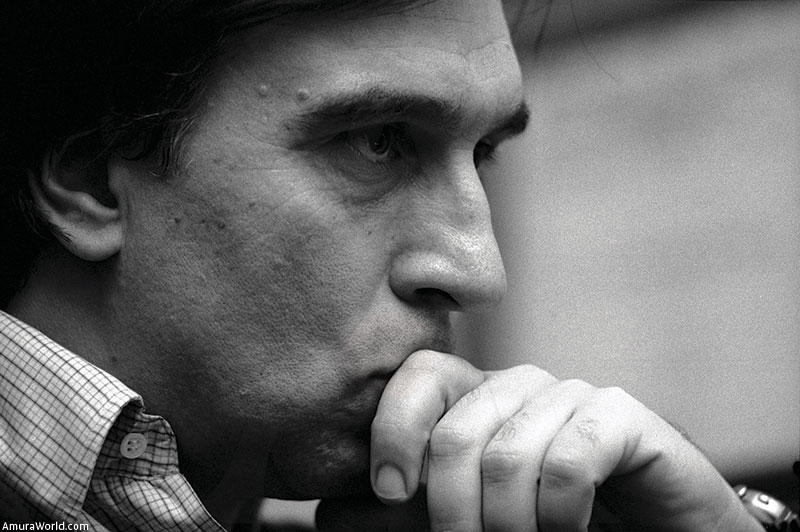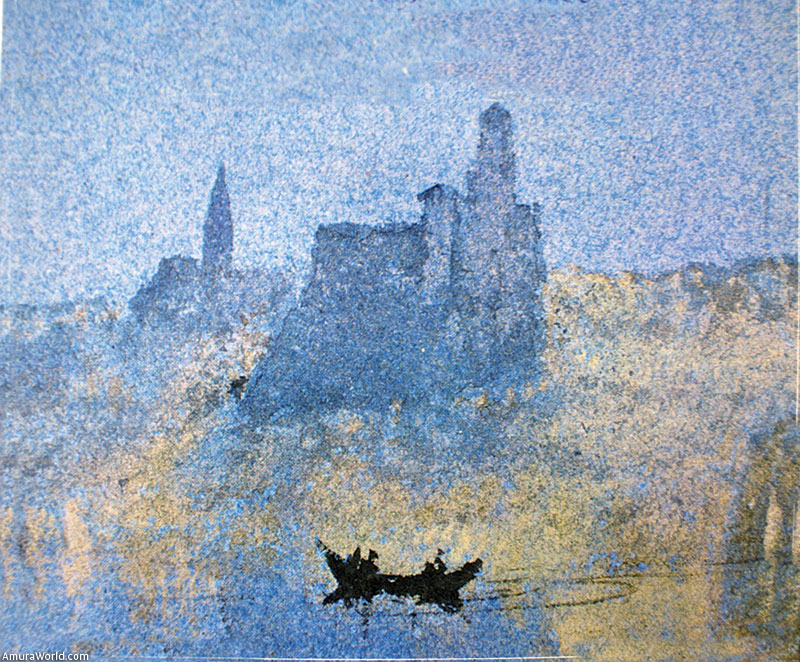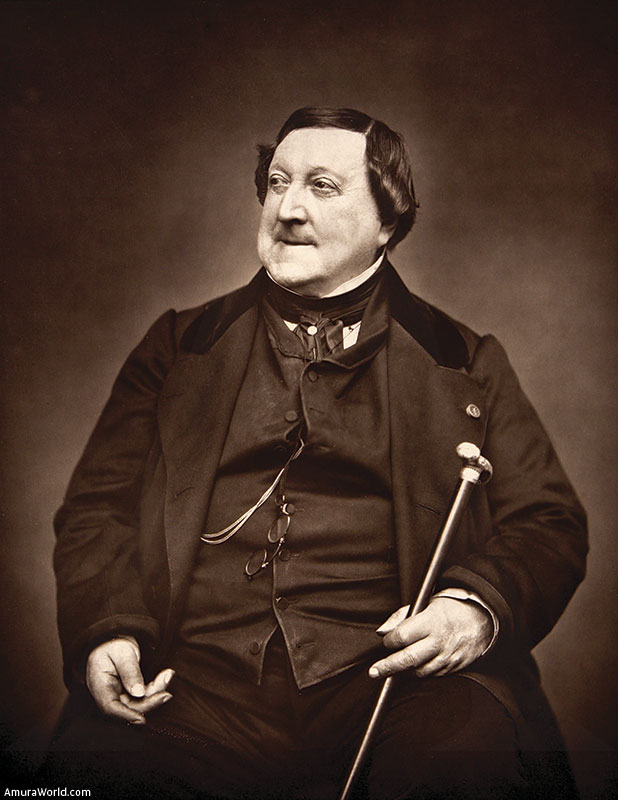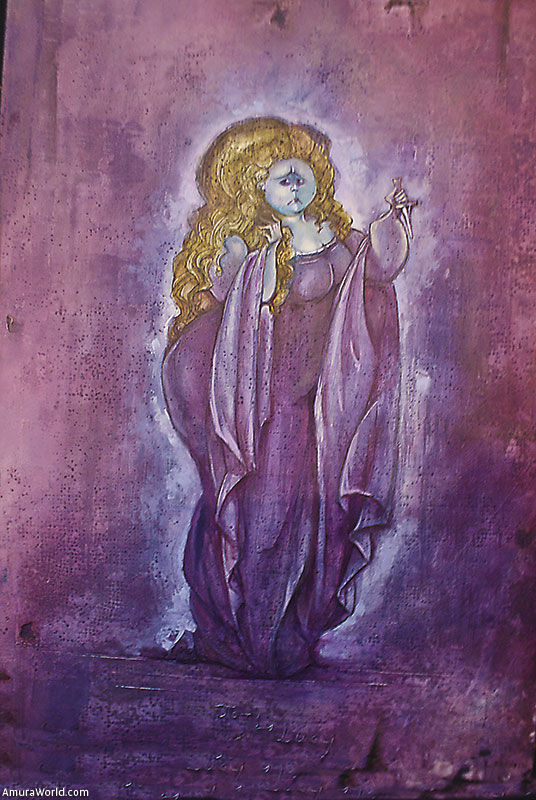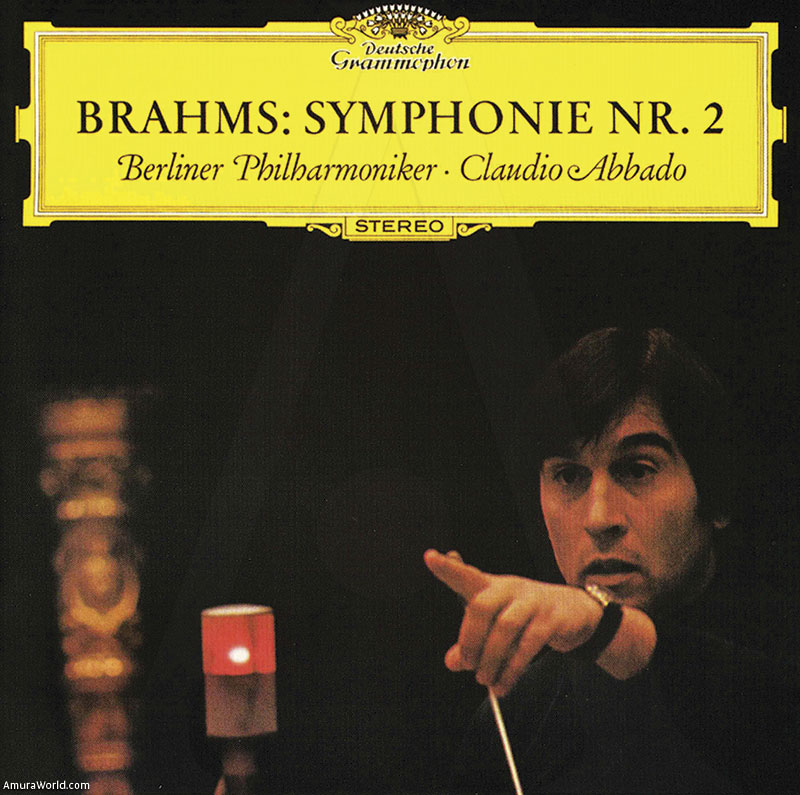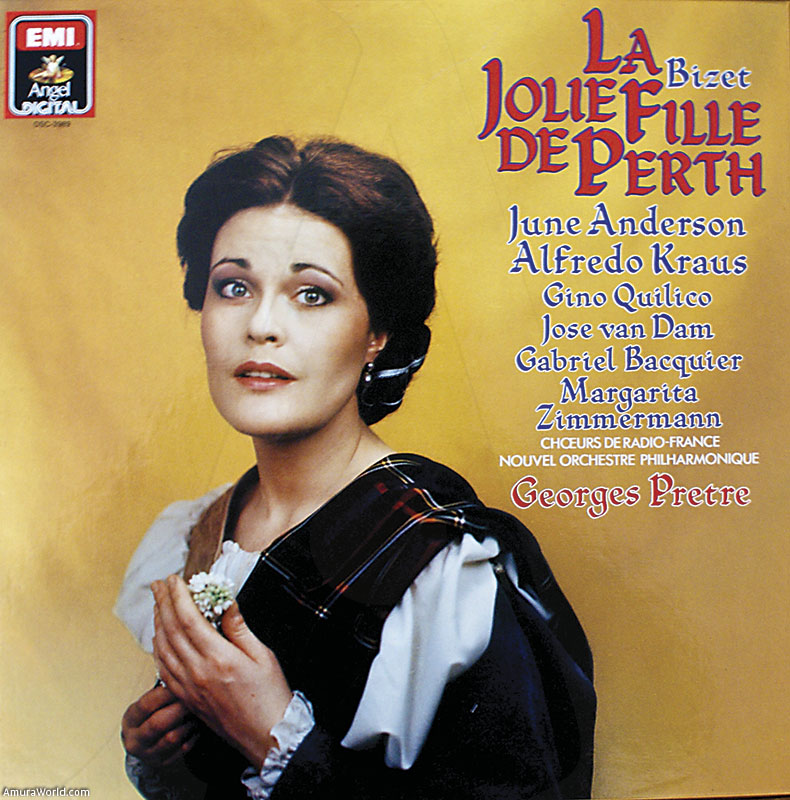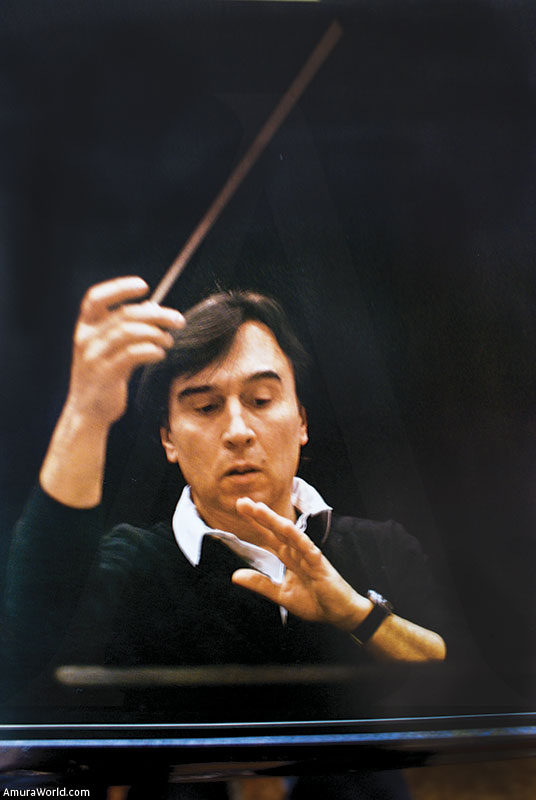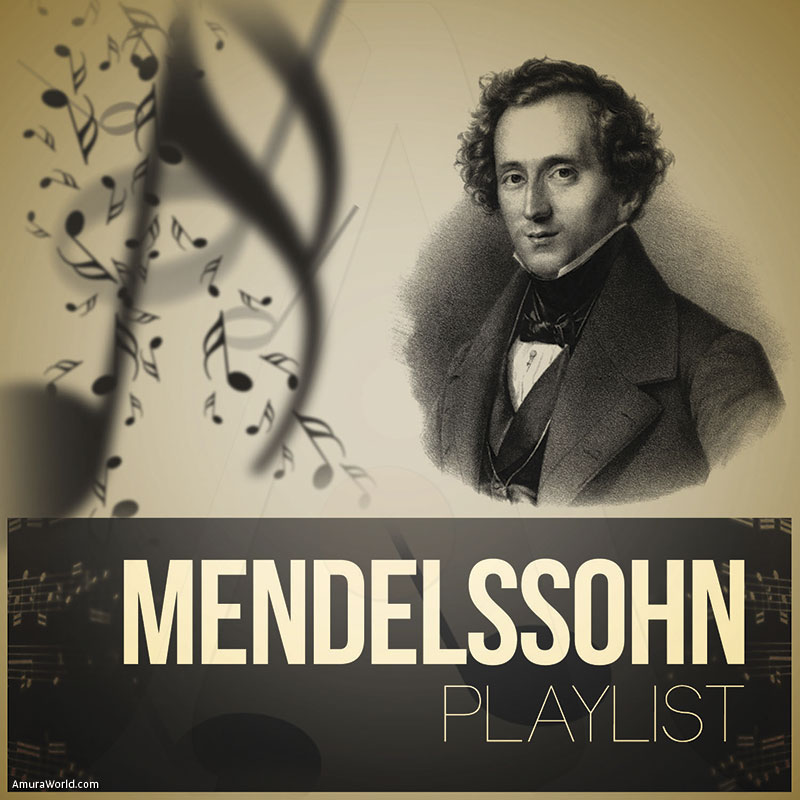Various composers, all foreigners, succumbed by the natural beauty of Scotland in it’s folkloric roots. They gave birth to compositions that form part of the basic repertoire and it is a pleasure to recommend them.
Felix Bartholdy Mendelssohn was born in Hamburg, Germany, on February the 3rd of 1809 and died in Leipzig the 4th of November at 1847. On few occasions does fortune smile so tenderly as it did on Felix “the happy” Mendelssohn. The loving kindness of wise parents provided the best tutors money could buy. The rambling Mendelssohn house and garden in Berlin became a musical rendezvous as soon as the boy Felix started to wield a baton over a youthful orchestra he assembled on Sundays. He played piano, organ and viola, and composed music too for these parties.
The fairy measures of the Midsummer Night’s Dream Overture which he wrote at seventeen still weave an enchanted spell. At twenty, as a result of one of these amateur performances, he conducted professionals in a revival of Bach’s long neglected Sr. Matthew Passion. Fired by its beauty, he did all he could from then on to open people’s ears to the genius of Bach. The formation of the Bach Gesellschaft (Bach Association) in 1850, after Mendelssohn’s death, was largely the result of his efforts.
He traveled widely, attracting like a magnet the best music and musicians wherever he went. Handsome, one of the finest pianists of his time, and an accomplished linguist, he was dearly beloved, especially in London, which he much preferred to Paris. His letters are charming, and give a vivid picture of his wanderings.
When he became conductor of the Gewandhaus Orchestra in Leipzig, he duplicated on a large scale the Sunday musicals of his youth. Rossini and Chopin visited him, Ferdinand David was his concert master, Schumann and he became close friends, and here he conducted Schubert’s C mayor Symphony, discovered by Schumann in Vienna. He organized and headed the first German Conservatory of Music, in Leipzig, to which he attracted a brilliant staff of teachers, and he traveled regularly from Leipzig to Berlin and Dresden to conduct the court orchestra. His home life with his wife and five children was happy.
Of his music Heifetz, the violinist, has said: “If it is conceivable that the music of Mendelssohn can die, then all music can die”. Wonderfully polished and fluent, it is accused of having little depth, but its effortless orderly sparkle and flowing melody can compensate for any real or fancied lack. The Italian, Scottish and Reformation Symphonies and the Fingal’s Cave Overture are imaginative program music at its best, the oratorio Elijah is one of the great choral works of literature, the songs and piano pieces and singing violin concerto hold their own in any company. In perpetuating the ideals of Mozart and Bach, in developing contemporary composers and reviving neglected ones of the past, he did music an inestimable service. His attributes, personal and professional, are so lovable that even at this date the thought of his early death is painful.
Symphony No 3 Scottish
Composed in 1842.
In the summer of 1829 Felix Mendelssohn arrived at Edinburgh to visit the chapel in ruins of Mary Stuart. The initial melody of the Scottish Symphony serves as guide. After the visit at Scotland he felt a nostalgic feeling and missed the humidity of the Scottish climate. His thoughts are expressed in the symphony (No. 3, of the five that he composed). The first movement recalls a nostalgia ant its atmosphere. The melancholy enters as a genial stroke of lightness where the composer describes a thunderstorm that opens its light to the chapel in ruins and the first notes form a transition in a scherzo.
The second movement is the most lyrical of all the work and reflects the scottish roots. The rich potential of Mendelssohn contrast a march before returning to the principal theme of the orchestra.
The finale bears the title of “allegro gueriero” describing the battles of the clans, brilliantly written and indications that a better world
lies ahead.
Max Bruch achieved immortality with his Scottish Fantasy and the Kol Nidrei, both products of his finest moments. Bruch was born in Cologne in 1838 and died in Friedenau in 1929. His compositions are sincere, melodic and with a fabulous structure and irresistible descriptions. He had less talent than Mendelssohn, Schubert or Brahms but the experts compared his style with all three.
Scottish Fantasy for Violin and Orchestra, Op. 46
It composed in 1880.
Several of the novels of Sir Walter Scott encouraged the creation of the Scottish Fantasy which premiered in Hamburg in 1880 Pablo de Sarasate. In each of the four movements one Bruch Scottish folk song that compiled in 1863.
After the introduction of the First Movement written for the brass the melody Old Robb Morris takes the stage.
Again as a preface of the Second Movement the composer has a vivacious dance Song of the Dusty Miller, first in the orchestra and then in the “solo” of the violin. The slow movement, “I’m Down for the lack of Johnnie” is first presented by the orchestra to embellishments by the solo violin. The finale enters with a vigorous passage for the violin and the scottish melody, “Scots Wha’ Hae”.
This work is a musical treasure that not be missed. Literally it transports us to the romantic Scotland with irresistible lyricism.
The pen of Sir Walter Scot inspired several composers to write important works.
La jolie fille de Perth, 1867, by Georges Bizet, failed with the public and the critics despite an initial acceptance.
The Suite of five orchestral selections is very attractive, despite the influence of Verdi, Bizet never held the interest in his time.
Lucia di Lammeroor inspired by The Bride of Lammermoor it’s an opera based on Scott’s that everyone knows and favorite of all the great sopranos since its release. Recounts a romance that ends tragically, envy, jealousy, murder and suicide. All ingredients worthwhile in life. This is Scotland in the late 17th century and is one of the quintessential bel canto jewels, La Donna del Lago, inspired Rossini who composed the masterwork with sensational main roles. The ‘premiere’ at the Teatro San Carlo in Naples narrates the adversity of James V as he is hidding from his enemies in Scotland with the alias ‘Hubert’, and also from his rival Roderick. The lady in question crosses the lake daily to assist the king and the victims of war between the clans. The plot takes place in Scotland in 1530 and narrates the rebellion of the highlanders against James V. All ends happily and the music is magnificent.
Recently the main operas of Rossini have returned to the repertoire thanks to the art of Monserrat Caballe, Katia Ricciarelli and Joyce di Donato.
Discography
Felix Mendelssohn
± Symphonies (complete);
A Midsummer Night’s Dream: Overture; The Hebrides, Op. 26; The Fair Melusina, Op. 3, Scherzo in G Minor from Octet Op. 20 London Symphony Orchestra, Claudio Abbado, Conductor (DG).
± Symhony No 3 Scottish.
The Hebrides, Overture, London Symphony Orchestra.
Peter Maag, Conductor (Decca).
Max Bruch
± Scottish Fantasy for Violin and Orchestra,
Heifetz, Sir Malcolm Sargent, Conductor, New Symphony Orchestra of London (RCA).
Gioaccino Rossini
± La Donna del Lago (complete),
Riccardo Muti, Conductor, Teatro alla Scala
Production (EMI).
Georges Bizet
± La Jolie Fille de Perth, (complete),
Nouvel Ochestra de Radio France, Georges Pretre,
Conductor, (EMI).
Gaetano Donizetti
± Lucia di Lammermoor (complete),
Sutherland, Pavarotti, Milnes, London Symphony
Orchestra, Richard Bonynge, Conductor (DECCA).
Text: Ricardo Rondón ± Photo: F. Axel Carranza

